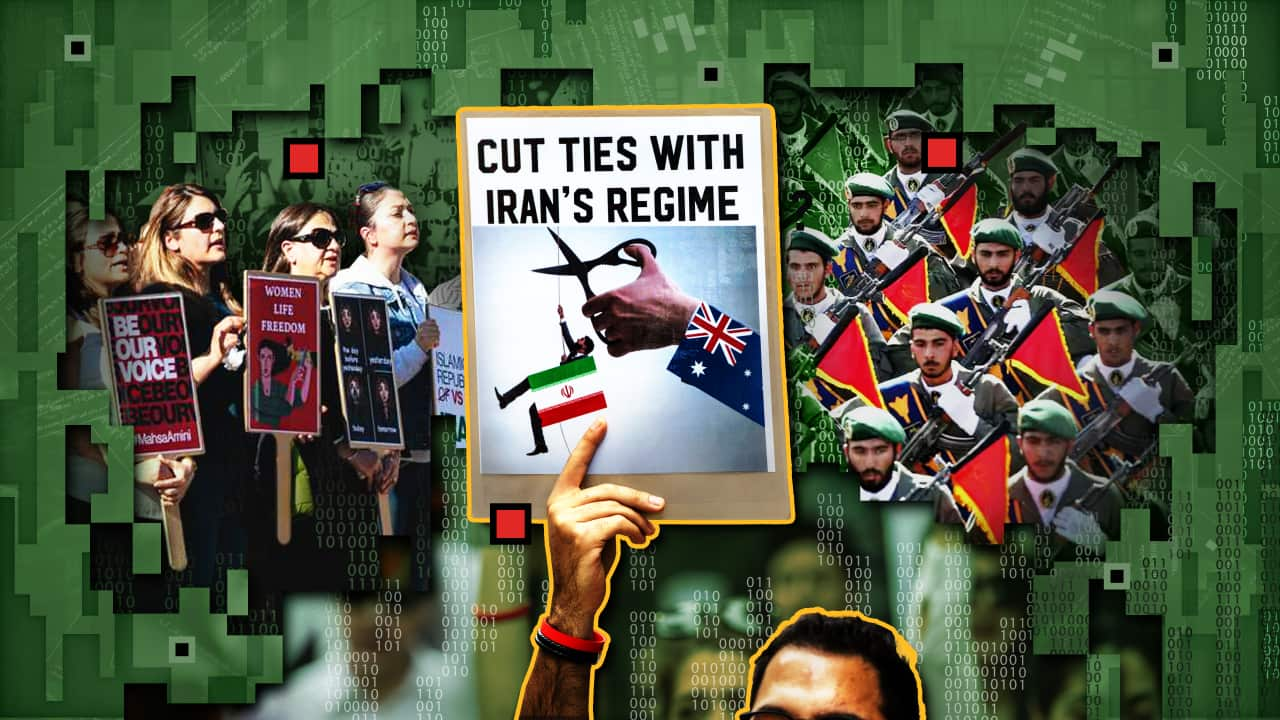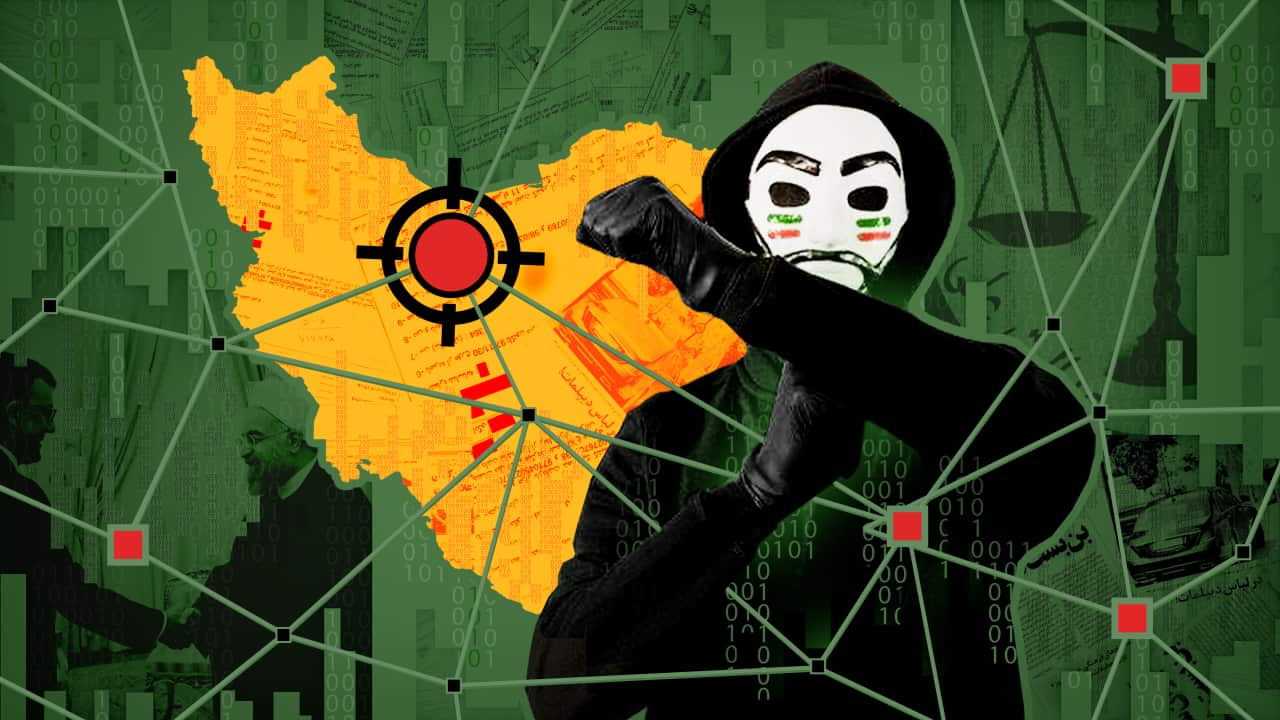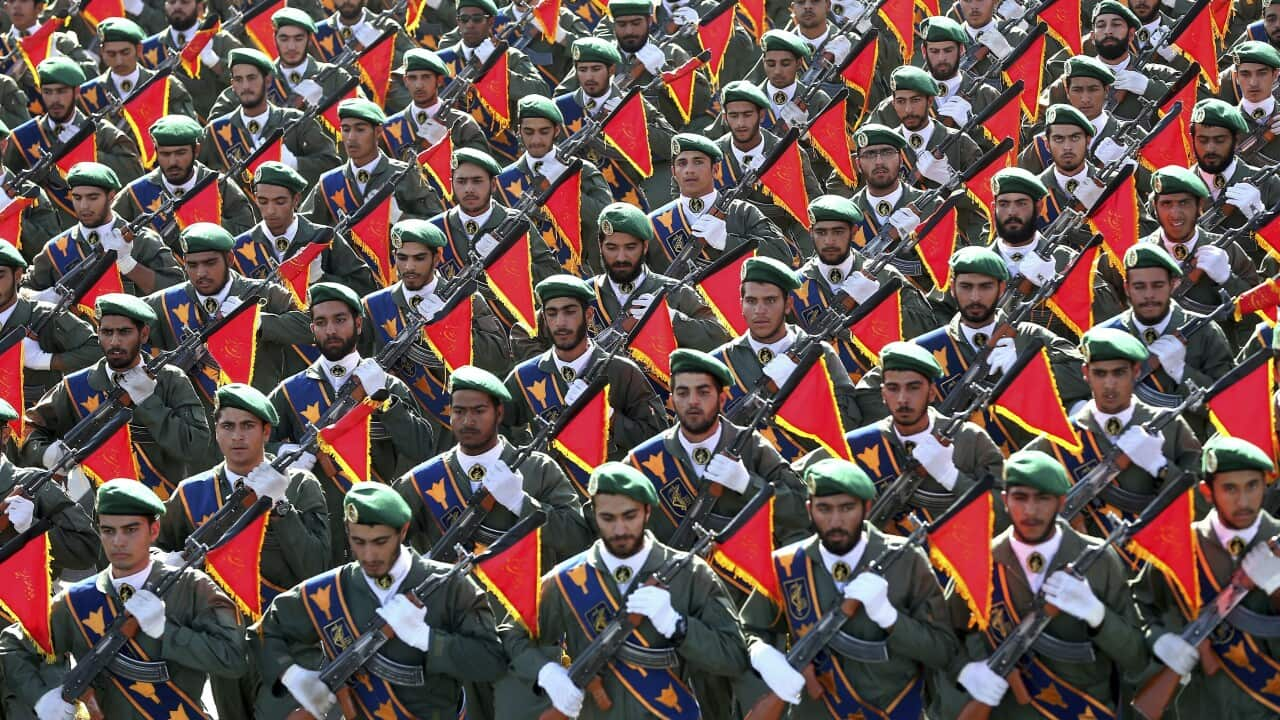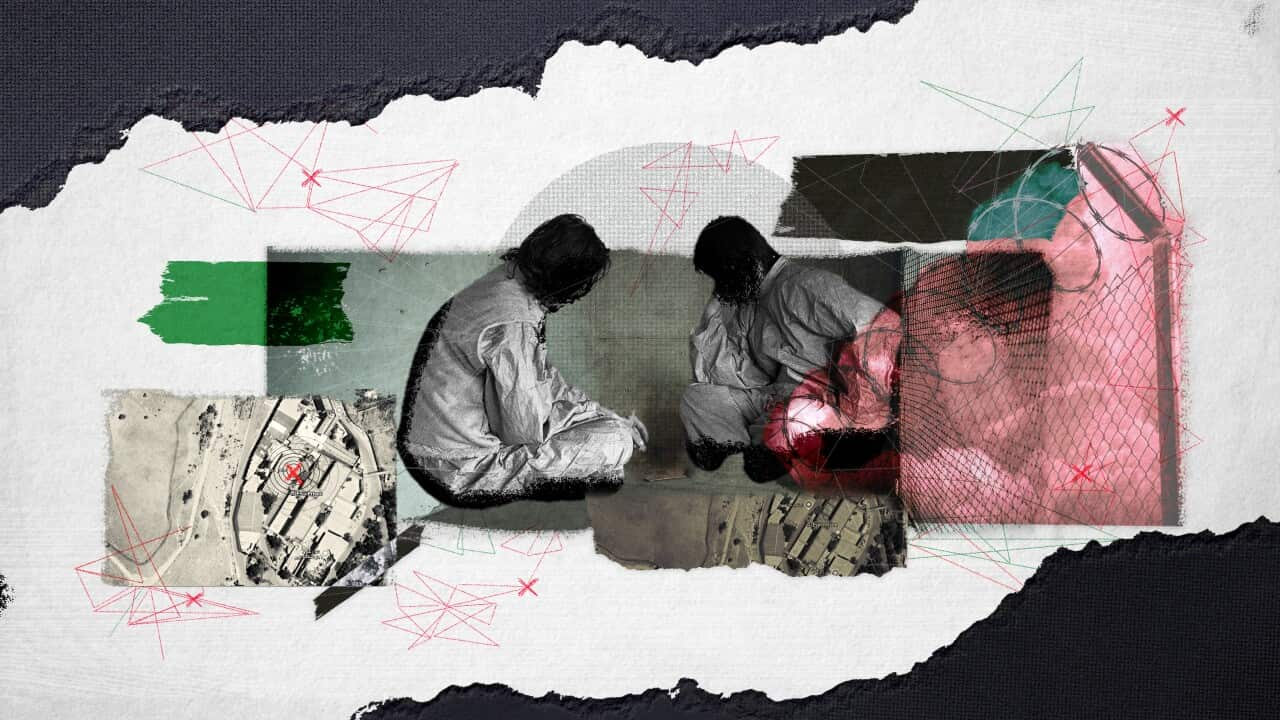

10 min read
Feature
Penny Wong has defended stance on Iran, after plot targeting diplomat revealed
Following an SBS News investigation into an alleged attack against Australia's ambassador to Iran in 2019, some community members are calling for their previous demands to be addressed by the Australian government.
Published
By Jennifer Scherer, Niv Sadrolodabaee
Source: SBS News
Image: Some Iranian Australians have told SBS News they don't feel Australia is taking their concerns about the Iranian government's activities seriously. (SBS, AAP / Jono Delbridge / Diego Fedele)
Tina Kordrostami fled Iran with her family when she was five years old — a trip that later turned out to be one-way, with no return ticket.
Now 30, Kordrostami is a Greens councillor for the City of Ryde in Sydney and an outspoken Iranian Australian activist. She says advocating for human rights in her home country has come at a high cost.
"I personally have sacrificed a lot, such as letting go of the idea of going back to Iran, letting go of the idea of seeing my family back there again," she tells SBS News.
Her mother was a member of Iran's Baha'i religious minority, and her father was from the Kurdish community — two groups that are reportedly persecuted in Iran.
She says activism has made her and other critics of Iran’s authoritarian regime vulnerable to becoming targets of foreign interference on Australian soil.

"[My activism has] placed a target on my family [in Iran].
"There are people who have done a lot more, who have sacrificed a lot more, and they have also been attacked, threatened and abused. This has been going on for a very long time."
Following an into an alleged assassination attempt on a former Australian ambassador to Iran, Kordrostami is urging the Australian government to increase protections for the Iranian diaspora in Australia, and repeating long-held community demands.
'What is that secret quota?'
Through documents leaked by Iranian hacktivist group Edaalate Ali, the investigation revealed Australia's embassy in Tehran and then-ambassador Ian Biggs became the target of attacks and an assassination plot in 2019. The alleged perpetrator was jailed for 17 months.
SBS News cannot confirm what motivated the alleged attacks.
The Department of Foreign Affairs and Trade (DFAT) refused to confirm or deny the claims detailed in the documents, and Biggs declined an interview with SBS News, saying: "I cannot comment on operational security or intelligence issues."
Foreign Minister Penny Wong reiterated the department's position on Wednesday when questioned by SBS World News Chief Political Correspondent Anna Henderson about why Biggs was allegedly targeted.
"I'm not going to comment on operational security, for obvious reasons, so I'm just not going to respond on any detail on that," Wong said.
"More broadly in relation to Iran, you would know that the Albanese government has taken stronger action in relation to Iran than any previous Australian government, both in terms of sanctions and our declarations with others on human rights.
You would also know that we have very strong laws in place to protect our democracy, and what I would always say to all governments and also to our diasporas here, is that we will safeguard our democracy.
In a separate statement, DFAT declined to respond to inquiries about whether the department had any communications with the Iranian government, the Iranian embassy in Australia or the Australian embassy in Iran following the release of the investigation.
"Where exactly does the Australian government draw that line as to the importance of its citizens' safety, the importance of its citizens' national security, the integrity that the country holds regarding international relations?" asks Kordrostami.
"What is that secret quota that needs to be filled … for the Australian government to act on its responsibilities and duties to its citizens? For us, the question is, how many more Australian lives need to be placed at risk?"
Nader Zoljalali, a member of the Board of Directors of the Australian Iranian Community Alliance (AICA), has echoed Kordrostami's calls.
"I felt that was an attack on Australian sovereignty and on the public's right to know about what happens to Australia — in Australia and abroad," he tells SBS News.
In response to a question about the safety of Iranian-Australians and national security, a DFAT spokesperson told SBS News in a statement: "Australia takes seriously the threat of foreign interference and will not tolerate, under any circumstances, attempts by foreign regimes to disrupt peaceful protests, suppress freedom of speech, or engage in hostile activities such as surveillance, harassment, and intimidation of individuals in our community."
Calls to list the IRGC as a terrorist organisation
Iran was mentioned directly in this year's Australian Security Intelligence Organisation (ASIO) threat assessment, released in February.
ASIO's director general, Mike Burgess, warned that Australia is "not immune to hostile nation states, such as Iran, undertaking acts of security concern on our shores or near region".
Zoljalali says he does not feel safe in Australia and believes the Islamic Revolutionary Guard Corps (IRGC), a branch of the Iranian armed forces that is separate from the army, is behind the foreign interference documented in Australia.
"We have overwhelming evidence of harassment, of threats. We have had cases of the agents and proxies of the Islamic Republic approaching Iranian activists and threatening them and, to some extent, taking action, trying to harm them," Zoljalali says.
"We don't feel safe … We have been advocating and asking for the IRGC to be listed as a terrorist organisation.
"They are the masterminds, they are the executors of the policy of fear and hostage-taking [in Iran]."

However, the Iranian ambassador to Australia, Ahmad Sadeghi, denied that the Iranian government was behind any foreign interference in Australia.
Kordrostami is also calling on the Australian government to list the IRGC as a terrorist organisation, in line with other countries such as the United States and Canada.
"We need a proper explanation from the Australian government as to why it's having such a hard time following in the same footsteps as Canada."
She says it would be a strong step "to make for our safety" and to recognise "the realities of what the Islamic regime of Iran stands for".
'Survival is their ultimate goal'
Momentum gathered in Australia around listing the IRGC as a terrorist organisation during the Woman, Life, Freedom movement in Iran, which began in September 2022 after the suspicious death in custody of .
The move was also as part of a Senate inquiry report in February 2023, titled 'Human rights implications of recent violence in Iran'.
"There is significant fear of the IRGC in the Iranian-Australian community — a fear which is founded in the clear evidence that the IRGC operates well beyond Iran's borders with the express purpose of threatening," the report stated.
It's a sentiment supported by some community members, including Zoljalali and Kordrostami.
"It's through the Islamic Republic's proxies and agents to Australia and other countries where people don't feel safe and don't feel protected to really speak the truth," Zoljalali says.
In response to the inquiry, the Albanese government argued that, as an organ of a "nation state", the IRGC is not the type of entity covered by the terrorist organisation provisions in the Criminal Code Act 1995, noting that the Australian government is "focused on taking meaningful steps to put pressure on the IRGC".
Since 2010, the IRGC has been subject to sanctions in Australia. The Labor government has also sanctioned 200 individuals and entities linked to Iran, including nearly 100 associated with the IRGC, since the Woman, Life, Freedom protests in 2022.
Alam Saleh, a senior lecturer in Iranian Studies at the Australian National University's Centre for Arab and Islamic Studies, says listing the IRGC would be a "political gesture".
"If they want to change the IRGC's behaviour, regional behaviour, [and] internal domestic behaviour, of course, this will not be the case," he explains.
"It will not help much in changing [the] IRGC's behaviour… More and more pressure on Iran has never changed the state's behaviour. The regime's behaviour… has been worsened.
The issue with the regime is to survive. So survival is their ultimate goal, and in so doing, they are willing to do whatever they can in order to confront Western pressures.
'Important step for our safety'
Some community members are also calling for the Iranian embassy to be removed from Canberra — a demand noted in the 2023 Senate inquiry report.
According to the report, the inquiry received a number of submissions outlining "the credible fears that Iranian embassies are used to facilitate the monitoring, surveillance and intimidation of critics" of the regime.
While the Senate inquiry report did not go so far as to recommend closing the embassy, it did suggest expelling any "Iranian officials found to be involved" in hostile behaviour against Australians.
LISTEN TO

'There is no democracy': Iranian-Australians boycotting Iran's presidential elections
SBS News
03:05
However, Kordrostami believes closing the embassy is "an important step" to ensure national and community safety.
"Whenever the Iranian community is speaking up against the regime, we're not just keeping Iranians in mind; we're keeping Australians in mind as well," she says.
"The Australian public [and] the Australian government, is at risk.
Every single day, it maintains this relationship with the regime in Iran, it's at risk.
Previously, the Australian government has said its bilateral relationship with Iran is in Australia's "national interests".
A spokesperson for DFAT told SBS News in a statement: "The bilateral relationship with Iran has never been an endorsement of the Iranian government but instead provides a channel for Australia to raise its interests and concerns."
Saleh says the government's stance makes Australia something of an outlier compared with other Western nations.
"Australia's policies towards Iran have been … much nicer and softer," he says.
"Australia's relationship with Iran is mainly economic, and it's all about trade.
"They can use this relatively good relationship as a channel to affect or to change Iran's behaviour, both domestically and regionally — or to convey the voice of Western concerns to Iran via Canberra."
However, some community members, like Kordrostami, believe their voices have not been heard despite their protests, claims of foreign interference and the alleged assassination plot against the Australian ambassador in Tehran, revealed last month by SBS News.
"We don't feel like we've been taken seriously. We don't feel that the government has done everything it possibly could to support us," she says.
"I did struggle a little bit with that [sense of] belonging growing up, but eventually, I considered myself to be an Aussie.
"The last few years have shown me that I am a second-class citizen. It showed me that I will never truly be considered equal to another Australian citizen."





